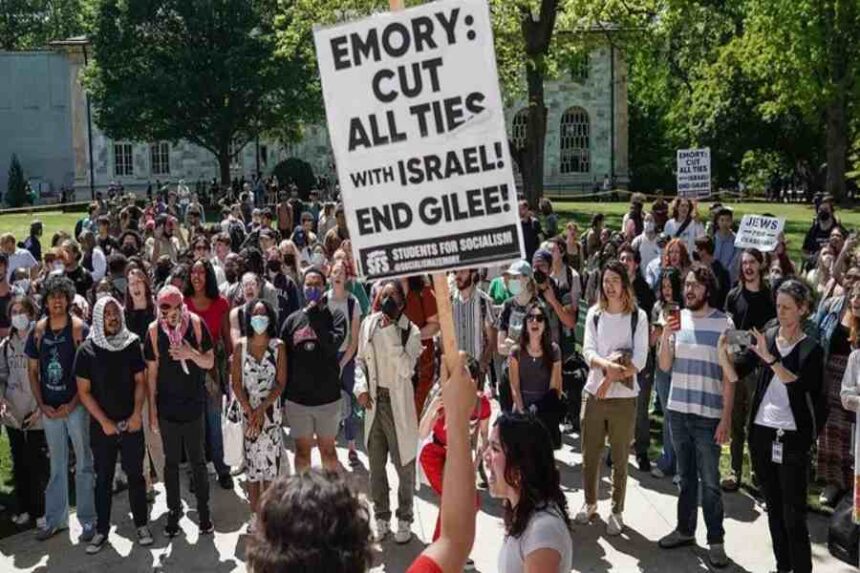Atlanta, GA — Amid escalating tensions and growing concerns about discrimination on college campuses, the U.S. Department of Education’s Office for Civil Rights has initiated a federal investigation into Emory University. This inquiry comes in response to allegations of persistent anti-Muslim discrimination, a concern that echoes throughout many American universities, marking a pivotal moment in the national discourse on campus civil liberties.
This investigation at Emory springs from a comprehensive civil rights complaint filed by the Georgia chapter of the Council on American-Islamic Relations (CAIR-Georgia) and Palestine Legal. The documentation presents a troubling picture of the campus environment where Palestinian, Arab, and Muslim students reportedly endure ongoing harassment and discrimination.
The grievances include derogatory labeling of students as “terrorists” and “fake Muslims,” and incidents where students’ flyers, mourning Palestinian casualties, were reportedly destroyed. Such acts of vandalism and hostility are alleged to have fostered an atmosphere of intimidation and isolation for the affected students, severely impacting their academic and social lives on campus.
Azka Mahmood, CAIR-Georgia’s executive director, articulated the gravity of the allegations. “The level of hostility these students face is untenable. It is our collective responsibility to ensure that educational environments foster learning and respect, not fear and alienation,” Mahmood remarked. The organization is pushing for a rigorous investigation by the Department of Education, hoping it will spur significant changes and hold the university accountable.
These allegations at Emory are not isolated but part of a broader pattern of reported discrimination that has surfaced at other prestigious institutions like Columbia University, Rutgers University, and the University of Massachusetts-Amherst. Reports from these universities support the narrative of an unsettling trend of systemic discrimination that appears to be proliferating across educational settings nationwide.
In-depth accounts from Emory detail a series of troubling incidents over the past year, climaxing with high-profile protests on the campus. These protests, occasionally turning chaotic, resulted in the arrest of 28 people during one confrontation in Emory’s Quad, with law enforcement deploying tear gas and Tasers to disperse the crowds.
Despite the upheaval, Emory University officials have reiterated their commitment to maintaining a safe and inclusive environment. “Emory does not tolerate behavior or actions that threaten, harm, or target individuals based on their identities or backgrounds,” reads an official statement from the university. However, this official stance contrasts sharply with the experiences reported by the complainants.
Reflecting on the university’s responses, a student known only as Ibrahim shared his disillusionment with the handling of their grievances. “Our pleas for a more understanding and proactive response went unheeded, forcing us to seek federal intervention,” he said. This sentiment underscores a significant disconnect between student experiences and administrative actions.
The complexity of the situation at Emory is magnified by the global geopolitical tensions that resonate within the student body, influencing campus dynamics and the intensity of interactions among students. This has cultivated a polarized atmosphere where discussions related to Palestinian rights and Israeli policies can quickly become incendiary, leading to personal attacks and broad accusations.
Legal experts and civil rights advocates closely monitor the Emory case, recognizing its potential to set precedents for how universities address allegations of discrimination based on national origin or political beliefs. Radhika Sainath, a senior staff attorney at Palestine Legal, emphasized the critical importance of upholding students’ rights to free expression. “Educational institutions must be safe spaces for learning and expression, not battlegrounds for political reprisals,” she noted.
As the Department of Education continues its investigation, the outcomes are eagerly awaited by the Emory community and other institutions across the nation. These findings could potentially reshape campus policies and strengthen the enforcement of civil rights in educational settings, ensuring that all students, irrespective of their backgrounds or beliefs, can pursue their education without fear or prejudice.
Meanwhile, the national conversation on campus discrimination continues to evolve, propelled by student activism, legal challenges, and an increasingly concerned public. As this story unfolds, it will undoubtedly prompt further reflection on the role of education in shaping societal values and the obligations of academic institutions to cultivate environments of diversity and inclusivity.




